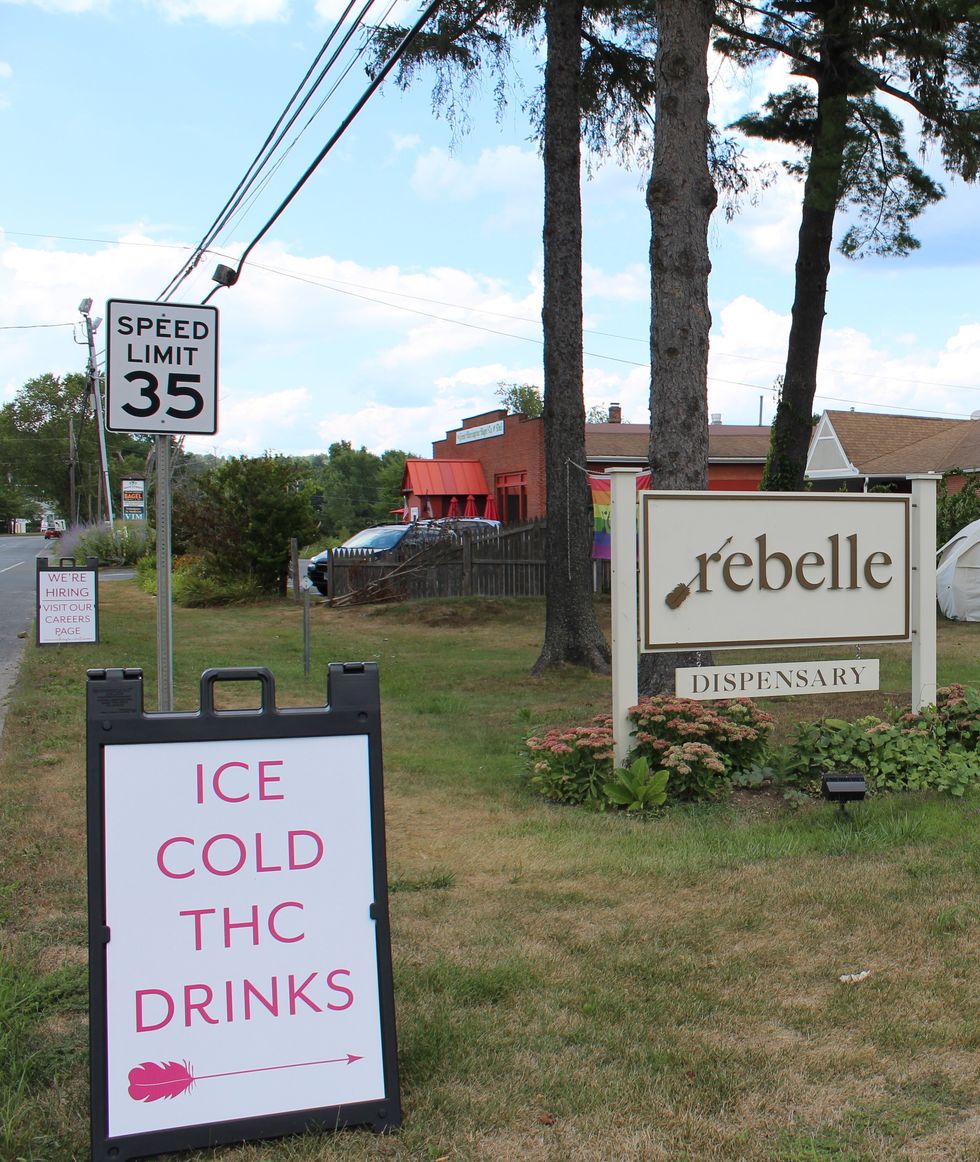Towns consider cannabis options

Rebelle Dispensary is one of several cannabis outlets in Great Barrington.
Photo by Terry Cowgill

This is the second in a series on the legalization of cannabis in Connecticut.
NORTH CANAAN — As towns across the Northwest Corner have struggled to adjust to the COVID-19 pandemic and change the way they do business, they can add another major challenge: how to handle private business interests that want to enter the retail cannabis sector or grow it for the wholesale market.
Connecticut legalized adult-use marijuana sales last year, and the state has put in place some guideposts and incentives with potential revenue streams that could be game-changers for cash-strapped towns.
Municipalities are free to regulate cannabis businesses — medical or recreational — as they would just about any other businesses. According to an analysis by the nonpartisan state Office of Legislative Research, towns may prohibit them from opening, reasonably restrict their hours and signage, restrict their proximity to religious institutions, schools, charitable institutions, hospitals, veterans’ homes or certain military establishments.
According to the Litchfield firm of Cramer & Anderson, which provides legal services to several Northwest Corner towns, a key provision of the new law stipulates that cannabis establishments must be zoned just as similar businesses would be unless municipalities regulate them through their zoning codes or ordinances.
Under Connecticut’s law, possession of 1.5 ounce of cannabis is legal. Since October 2021, medical marijuana patients have been able to grow up to three mature and three immature plants at home starting, with a cap of 12 total plants per household. By July 1, 2023, all adults will be able to grow at home under the same rules.
In neighboring Massachusetts, the cultivation, sale and use of recreational cannabis-related products was legalized through a 2016 ballot initiative.
Cramer & Anderson says it’s also worth noting that, unlike in the Bay State, municipalities in Connecticut that allow micro-cultivators and adult-use cannabis stores “are subject to a cap that limits operations to one retailer and one micro-cultivator for every 25,000 municipal residents until July 1, 2024.” In addition, successful applicants must obtain a special permit from the town for both retail and cultivation uses.
But we’re still in uncharted territory with implications that are controversial, and towns are scrambling to craft appropriate regulations, ban cannabis operations altogether or enact moratoriums on cannabis applications to give planning and zoning commissions time to amend zoning codes that match this challenge.
Hearst Connecticut Media conducted a survey early this year and found that, of Connecticut’s 169 cities and towns, 22 have established bans on sales and cultivation, while 53 have enacted moratoriums on applications.
In Kent, retail stores are prohibited from selling recreational cannabis. In January, Sharon passed a six-month moratorium. Danbury passed a one-year moratorium last July. In Norfolk, a public hearing was held earlier this month to allow public input on several zoning proposals, one of which would regulate the retail sale of cannabis, Tom Fahsbender, chair of the Planning and Zoning Commission (P&Z), told The Lakeville Journal.
But perhaps the most interesting case lies in North Canaan, where the Planning & Zoning Commission held a public hearing in May on a proposed temporary moratorium on cannabis applications.
“We have a rare opportunity for revenue in North Canaan and in light of rising costs, especially education costs, we need to take a serious look at putting a dispensary here,” said former Selectman Susie Clayton.
The town’s taxpayers are frustrated over a steep increase this year of $745,000 in the town’s Region One assessment, placing what officials feel is an undue burden on Canaan.
Though by comparison North Canaan’s population is lower than Salisbury’s, it still has to pay substantially more to the regional school district because it sends more than twice as many students to Housatonic. In addition, Salisbury’s weighted voting power on the Region One Board of Education is higher because North Canaan’s population is lower.
The higher tax burden is compounded by the fact that North Canaan’s tax rate is higher because its property values are generally lower than Salisbury’s. North Canaan Selectman Craig Whiting said last fall that the Region One assessment is “bringing our town to its knees.”
Its unknown how much revenue the cannabis industry could bring to North Canaan.
Twenty minutes to the north, Great Barrington, which has about twice as many full-time residents as North Canaan, took in more than $1 million in the first six months after Theory Wellness, the town’s first recreational cannabis store, opened in January 2019 to long lines that snaked almost around the corner to the Price Chopper. Half a dozen others have since opened.
Great Barrington’s finance director said 12 months ago that since 2019, the town had taken in $6.7 million in cannabis revenue, though officials expect the numbers to decline should sales begin in Connecticut and in New York, where the state Legislature also legalized adult-use last year.
For some perspective, in 2019 Great Barrington’s annual budget was a little more than $30 million, including its assessment to fund the regional school district.
“This will never turn into Great Barrington,” North Canaan resident Ed Capowitz said at the hearing. “We’re allowed one facility. Why turn down that revenue?”
“Our tax bills are getting higher and I know that the ... selectmen are having trouble even trying to get the budget raised whatsoever because there’s just not enough money to go around,” added Ruth Adotte. “So what I’m saying is it would help with the taxes.”
The Connecticut Department of Consumer Protection, which regulates cannabis, has laid out the taxing scheme for retail cannabis sales: the standard 6.35% sales tax levied on most retail items, a 3% sales tax dedicated to the city or town where the sale occurs, and a tax based on THC content that will cost approximately 10 to 15% of the sale price.
The state estimates the total cumulative taxes paid on cannabis purchases to be roughly 20% of the retail price.
Tim Abbott, who chairs the North Canaan P&Z, said no applications have been received yet. Weeks after the public hearing in May, the commission voted unanimously to enact an eight-month moratorium on cannabis applications to give the panel time to draw up regulations, such as which parts of town are appropriate for cannabis, hours of operation, signage and recovering costs for additional policing.
“These are the areas where we have some control,” Abbott said, who said he is neutral on whether to allow sales and cultivation of the product.
A townwide referendum on whether to allow cannabis sales and/or cultivation is tentatively slated for November. If it passes, Abbott expects the regulations should be ready for review by March 2023.
Abbott emphasized that, “Kicking the can down the road isn’t the purpose of a moratorium. It buys you time to do your due diligence, to educate yourself as a commission, to know the law, to see what it might look like in the event that the new change happens.”
The sentiment among Canaanites could spur action. Some residents at May’s public hearing objected even to a moratorium. Lyle Kloke said he thought the commission was “negligent” in not addressing the issue even sooner.
KENT — Kent School's girls hockey team defeated Millbrook School 4-3 in a Valentine's Day showdown on the ice Saturday, Feb. 14.
There was no love lost between these Founders League schools situated on opposite sides of the Connecticut/New York border. Both teams had similar win-loss records, and both were eager to add to the "win" column.
Fierce action from both teams commenced right from the opening face-off, and it looked to be an equal battle. Dakota Boyle and Ainsley Moffitt scored quickly for Kent giving them a 2-0 lead after only six minutes.

The second period started, again with fast but equal aggression from both teams. The Millbrook and Kent goalies were sharp, turning away chance after chance for the bulk of the period.
Millbrook’s Brooke Ness found the net near the end of the second period, as did Lily Kennedy and the game was tied 2-2.

Excitement grew throughout the contest and the final period started with high hopes from both teams and fans. The two sides traded goals, only adding to the drama.
The deciding moment came when Kent's Abby Roberson scored the game-winning goal, securing a tough but deserved 4-3 victory for Kent.
Kent's record advanced to 7-12-1 and Millbrook moved to 6-10-3.

There are artists who make objects, and then there are artists who alter the way we move through the world. Tim Prentice belonged to the latter. The kinetic sculptor, architect and longtime Cornwall resident died in November 2025 at age 95, leaving a legacy of what he called “toys for the wind,” work that did not simply occupy space but activated it, inviting viewers to slow down, look longer and feel more deeply the invisible forces that shape daily life.
Prentice received a master’s degree from the Yale School of Art and Architecture in 1960, where he studied with German-born American artist and educator Josef Albers, taking his course once as an undergraduate and again in graduate school.In “The Air Made Visible,” a 2024 short film by the Vision & Art Project produced by the American Macular Degeneration Fund, a nonprofit organization that documents artists working with vision loss, Prentice spoke of his admiration for Albers’ discipline and his ability to strip away everything but color. He recalled thinking, “If I could do that same thing with motion, I’d have a chance of finding a new form.”
What Prentice found through decades of exploration and play was a kind of formlessness in which what remains is not absence, but motion. To stand before one of his sculptures is to witness a quiet choreography where metal breathes, shadows shift and time softens.
After Yale, Prentice co-founded the architectural firm Prentice & Chan in 1965. The firm designed affordable housing projects in New York City, work largely led by partner Lo-Yi Chan. Prentice also designed custom single-family homes and continued to develop sculptural ideas alongside his architectural practice. After leaving the firm in 1975 and eventually relocating full time to Cornwall, he undertook a range of local architectural projects while increasingly devoting himself to sculpture.
Prentice began producing larger-scale sculptural commissions in the 1970s, during a period of national expansion in public art funding tied to new building projects. His first major commission came in 1976 from AT&T, helping launch a career that would bring his kinetic installations to corporate, institutional and public spaces across the United States and abroad. While his work follows in the lineage of Alexander Calder and George Rickey, critic Grace Glueck observed that its “gently assertive character is very much his own.”
In Cornwall, Prentice established a studio devoted to designing and fabricating kinetic sculpture, where he continued working for decades. He had many assistants over the years including local artists David Bean, Ellen Moon and Richard Griggs. David Colbert worked with Prentice for many years, assisting with fabrication, installation and project development and in 2012, Prentice established Prentice Colbert Inc., helping ensure that fabrication and development of large-scale commissions could continue beyond his lifetime.
Colbert said Prentice could be imperious, but came to understand that he valued thoughtful critique over agreement. “That evolved into a free and easy give-and-take, along with some fierce arguments,” he said. “Our relationship was always developing, right through to the end.”
In the mid-1990s, Prentice was diagnosed with macular degeneration, a condition that gradually narrowed his field of vision. Rather than turning away from the visual world, he leaned further into it, focusing on movement, light and peripheral perception — on what could be felt as much as seen. The Vision & Art Project film documents this period of his life and the ways he adapted his creative process.
Even in his final years, Prentice continued experimenting. In the summer of 2025, he created a series of drawings titled “Memory Trees,” produced from recollection as his eyesight declined. The series sold out at the Rose Algrant show that August, offering a poignant example of an artist adapting and creating throughout their lifetime.
“He was interested in whimsy,” said Nora Prentice of her dad. “But he also worked seven days a week,” she said. “He’d come in for dinner and then go right back out.” His studio was known for its atmosphere of curiosity and play, with music often drifting through the workspace as sculptures moved overhead in careful, measured rhythms. His work reminds viewers how profoundly small movements shape perception, and how change itself may be the only constant.
In his poem “Among School Children,” William Butler Yeats asks, “How can we know the dancer from the dance?” Prentice offered his own answer. “I’m not making the dance,” he said. “The wind is making the dance.”
As Nora reflected, “I think that’s how he would want to be remembered: for making the wind visible.”

Want more of our stories on Google? Click here to make us a Preferred Source.
Laurie Fendrich and Peter Plagens at home in front of one of Plagens’s paintings.
He taught me jazz, I taught him Mozart.
Laurie Fendrich
For more than four decades, artists Laurie Fendrich and Peter Plagens have built a life together sustained by a shared devotion to painting, writing, teaching, looking, and endless talking about art, about culture, about the world. Their story began in a critique room.
“I came to the Art Institute of Chicago as a visiting instructor doing critiques when Laurie was an MFA candidate,” Plagens recalled.
“He was doing critiques with everyone,” Fendrich said of Plagens. “We met at one of those sessions and, well, what can I say. We fell in love instantly.”
Fendrich speaks candidly about the pressures that shaped her early life choices. “We both married the first time at 21, which a good number of women of my generation did without much thought.” Her first husband was a good guy, she says, but “we weren’t suited for each other at all, even though he suited my parents perfectly.” Her decision to get a divorce was seismic. “My mother didn’t speak to me for a year.” Time softened the rupture. “One day she told me, ‘I see now why you left.’”
Fendrich had a rigorous liberal arts education at Mount Holyoke. “I studied painting and drawing, but I also got interested in political philosophy. Plato, Aristotle, Machiavelli — Rousseau was my big guy — Tocqueville, everybody. And I still read them.” Plagens’s path was less formal. “I went to USC at 17,” he said, “and declared English as my major. It was a frat school, and I was in one for the first two years. Then I started doing the cartoons for the Daily Trojan, took a couple art classes, and thought, ‘Wait a minute, I like this.’”
Culturally, they diverged just as sharply. “I came from a fairly puritanical family that didn’t even go to the movies,” Fendrich said. Plagens, by contrast, grew up immersed in pop culture. “My father was an omnivorous reader,” he said, “and a jazz fan, and he shared these passions with me.” In 1966, Plagens walked into Artforum’s LA office and said, “I want to write reviews.” He was paid five dollars per piece. “Gasoline was 23 cents a gallon, so it went a long way.”
Over time, the couple slowly fused their educations. “He taught me jazz, I taught him Mozart,” Fendrich said with a laugh. “I’ve had a movie education from him; he read Jane Austen because of me.”

During their early years in LA, Plagens taught at USC, and Fendrich at Art Center College of Design. In 1985, they decided “our kind of abstraction would do better in New York,” as Fendrich put it. “So, we up and moved to Tribeca with $10,000 and a toddler.”
Both artists grounded their artistic careers in teaching and writing. “Teaching, which I loved, gave me the financial stability to be an artist,” Fendrich said, reflecting on her 27 years as a professor at Hofstra. “It meant that being an artist didn’t require I make money from every show. I didn’t start writing until 1999, but though I write for publication frequently, I make hardly any money at it.”
Artistically, they guard each other’s independence. “We have unspoken rules,” Plagens said. “You don’t comment on someone’s work while they’re in the middle of creating it.” Critique comes by invitation only. “He’s not mean, just direct,” said Fendrich. Over time, their aesthetics have subtly converged. “My work has gotten cleaner from looking at his,” she said. “He’s gotten more colorful because of me.”
The two have had several two-person exhibitions. At a recent duo show at the Texas Gallery in Houston “Laurie’s paintings flew off the wall,” Plagens recalled. “Me, well, not so much.”
Plagens’s parallel career in journalism shaped their lives in tangible ways. He worked as art critic at Newsweek from 1989 until 2003 and currently contributes reviews of museum exhibitions to The Wall Street Journal. “Being at Newsweek was one of the luckiest breaks I ever had,” he said. “They paid me to see things I would gladly pay to see.”
Their creative processes mirror their personalities. “I start with a specific idea,” Fendrich said, “and then modify things as I paint.” Plagens laughed. “I start with complete mush, just blurting it out and spending the rest of the time fixing it.”
In 2019, they made what Fendrich calls “a decision of contraction.” They left the TriBeCa loft they had lived in for three decades, sold their Catskills home with its large studio, and moved full-time to a former auto repair shop in Lakeville, now a house where each has a studio, and the ground floor retains the open feel of a loft.
What sustains them in life, art and love, decades in, are endless conversations — and arguments — about art, history, exhibitions, books and movies. That exchange, ongoing and rigorous, may just be the masterpiece of their shared life.
Hyalite Builders is leading the structural rehabilitation of The Stissing Center in Pine Plains.
For homeowners overwhelmed by juggling designers, architects and contractors, a new Salisbury-based collaboration is offering a one-team approach from concept to construction. Casa Marcelo Interior Design Studio, based in Salisbury, has joined forces with Charles Matz Architect, led by Charles Matz, AIA RIBA, and Hyalite Builders, led by Matt Soleau. The alliance introduces an integrated design-build model that aims to streamline the sometimes-fragmented process of home renovation and new construction.
“The whole thing is based on integrated services,” said Marcelo, founder of Casa Marcelo. “Normally when clients come to us, they are coming to us for design. But there’s also some architecture and construction that needs to happen eventually. So, I thought, why don’t we just partner with people that we know we can work well with together?”
Traditionally, homeowners hire designers, architects and contractors separately, a process that can lead to miscommunication, budget overruns and design revisions once construction begins. The new partnership seeks to address those challenges by creating a unified team that collaborates from the earliest planning stages through project completion.
“We can explore possibilities,” Marcelo said. “Let’s say the client is not sure which direction they want to go. They can nip that in the bud early on — instead of having three separate meetings with three separate people, you’re having one collaborative meeting.”
The partnership also reflects an expanded view of design, moving beyond surface aesthetics to include structural, environmental and performance considerations. Marcelo said her earlier work in New York City shaped that perspective.
“I had a 10-year career in New York City designing townhouses and penthouses, thinking about everything holistically,” she said. “When I got here and started my own business, I felt like I was being pigeonholed into only the decorative part of design. With the weight of an architect on our team now, it has really helped us close those deals with full home renovations, ground up builds and additions.”
The team emphasizes what it describes as high-performance design, incorporating modern building science, energy efficiency and improved air quality alongside aesthetic goals.
“If you’re still living inside 40-year-old technology and building techniques, we haven’t really handed off the best product we could,” said Soleau. “The goal is to not only to reach that level of aesthetic design but to improve the envelope, improve the living environment within a home and bring homes up to elevated standards of high-performance building.”
This integrated approach has proven particularly useful for renovation projects, where modern materials and systems can be thoughtfully incorporated into older structures. The firms also prioritize durability and long-term functionality, often incorporating antiques, vintage elements and high-quality materials designed to support clients’ lifestyles.
“I’m very big on investing in pieces that are going to be quality and last you the test of time,” Marcelo said. “Not just designing for a five- to 10-year run, but really designing for the long haul.”
The collaboration is already underway on several projects, including a major renovation in Sharon that involves rebuilding a 1990s modular home to maximize views while upgrading structural and performance systems. The firms are also exploring advanced visualization technology that would allow clients to experience projects through virtual reality before construction begins.
“For me, as somebody who wants to take the project all the way from beginning to end and make the process as effortless as possible for my client, it’s easier to do that with collaboration and a team than to do it alone,” Soleau said. “Most clients, especially second-home owners, want a team that can lead the project from concept through completion; aligning design, budget, and construction.”
On Feb. 19, the three firms will officially launch the initiative at an invitation-only event at The Stissing Center in Pine Plains, where Hyalite Builders is leading the structural rehabilitation of the historic building. A limited number of “hard hat tour” reservations will be available by request, providing rare, behind-the-scenes access while work is actively underway. Those interested in attending may contact event organizer Lauren Fritscher of Berkshire Muse at hello@berkshiremuse.com.
Autumn Knight will perform as part of PS21’s “The Dark.”
This February, PS21: Center for Contemporary Performance in Chatham, New York, will transform the depths of midwinter into a radiant week of cutting-edge art, music, dance, theater and performance with its inaugural winter festival, The Dark. Running Feb. 16–22, the ambitious festival features more than 60 international artists and over 80 performances, making it one of the most expansive cultural events in the region.
Curated to explore winter as a season of extremes — community and solitude, fire and ice, darkness and light — The Dark will take place not only at PS21’s sprawling campus in Chatham, but in theaters, restaurants, libraries, saunas and outdoor spaces across Columbia County. Attendees can warm up between performances with complimentary sauna sessions, glide across a seasonal ice-skating rink or gather around nightly bonfires, making the festival as much a social winter experience as an artistic one.
The Dark’s lineup includes several world and U.S. premieres. Highlights include Thomas Feng performing “Night Prayers,” a program of compositions by late Ethiopian composer and Orthodox nun Emahoy Tsegué-Maryam Guèbrou; Phil Kline’s outdoor participatory score “Force of Nature (February);” an audiovisual collaboration between composer David Lang and Academy Award-nominated filmmaker Bill Morrison; an interdisciplinary performance by Lee Ranaldo of Sonic Youth and multimedia artist Leah Singer; and “We Survived the Night: A Coyote Story in Four Parts” by Julian Brave NoiseCat.
For more information about The Dark or to purchase tickets, visit ps21chatham.org/the-dark

Want more of our stories on Google? Click here to make us a Preferred Source.

Want more of our stories on Google? Click here to make us a Preferred Source.